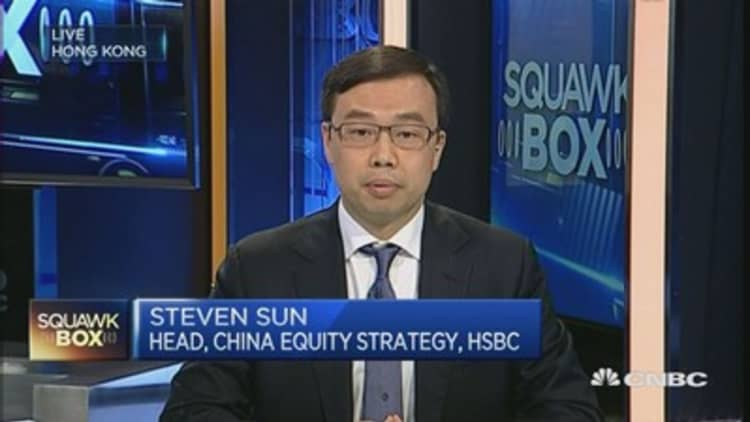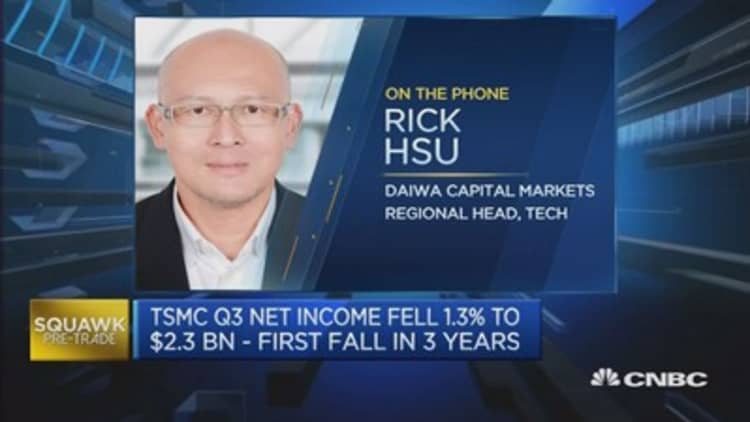Asian equities cruised higher on Friday, thanks to an encouraging lead from Wall Street and as investors bet on the possibility of further stimulus measures from Japan and China.
Major U.S. averages rallied more than 1 percent overnight, thanks to a jump in financials and soft economic data that bolstered the case for a delay in the rise of U.S. interest rates.
The and S&P 500 recovered to close above the psychologically key levels of 17,000 and 2,000 respectively. The Nasdaq Composite jumped 1.8 percent on Thursday.
Mainland stocks up
Share markets in China lurched higher in the final hour of trading, with the key Shanghai Composite rallying 1.6 percent.
The CSI300 Index of the largest listed companies in Shanghai and Shenzhen closed up 1.4 percent, while the smaller Shenzhen Composite also widened advances to end up by the same margin.
"I think markets are looking at next week's data as 'bad numbers mean more monetary easing to support and bolster growth' hence the positive reaction you are seeing today," Steven Sun, head of China equity strategy at HSBC, told CNBC Asia's "Squawk Box." Sun has an 'overweight' call on mainland equities.
A barrage of economic data are due out of the world's second-biggest economy on Monday, with the big powwow being third-quarter gross domestic product (GDP) due at 10am local time.
According to a Reuters poll of 50 economists, China's growth likely slowed to 6.8 percent from the same period last year, down from 7 percent in the second quarter.
Meanwhile, Hong Kong's Hang Seng index bounced up 0.8 percent.
Bucking the uptrend, Wynn Macau shares receded 3.4 percent after the casino and hotel operator announced on Thursday a fall in profit for the three months to September. Wynn attributed the decline in net income to a sharp slowdown at its Macau operations.

Nikkei up 1.1%
Japan's Nikkei 225 index extended gains on the back of heightened expectations for further Bank of Japan (BOJ) stimulus.
"People are looking for ways to make money on further easing because the sentiment that's being pushed by the street and by brokers is that there will be fresh stimulus from the BOJ," said Gavin Parry, managing director at Parry International Trading, told Reuters.
Real estate counters swung up; Tokyu Fudosan Holdings rallied 5.2 percent, while Mitsui Fudosan and Mitsubishi Estate ended up 1.7 and 0.9 percent respectively.
Financials were also among the favorites of investors, with Mitsubishi UFJ Financial Group and Sumitomo Mitsui Financial Group climbing more than 1 percent each. Nomura Holdings and Daiwa Securities surged 2.3 and 1 percent respectively.
Suntory Beverage & Food will unwind its joint venture with Tsingtao Brewery amid stalling sales in the fiercely-competed Chinese market, the Nikkei business daily reported. Shares of the beverage conglomerate advanced 1.6 percent.
Read MoreWhy London's fintech scene is courting Japan
ASX gains 0.7%
Australia's S&P ASX 200 index finished near a seven-week high that it attained earlier in the session.
Commonwealth Bank of Australia closed up 1.5 percent, while National Australia Bank and Australia and New Zealand Banking gained 0.8 and 0.4 percent respectively.
Copper miner Aditya Birla Minerals soared 30.6 percent, thanks to a surprise takeover bid from Perth-based Metals X.
By contrast, Rio Tinto pared gains to slide 1 percent, after the global miner announced a 17 percent rise in third-quarter iron ore shipmentsto 91.3 million tonnes and said it remained on track to meet full-year guidance of 340 million tonnes. Shares of BHP Billiton edged down 0.5 percent, tracking a fall in its U.S. ADR on the back of falling iron ore prices.
Earlier in the session, the Reserve Bank of Australia (RBA) issued a warning in its biannual Financial Stability Review that lending standards for home loans had been looser than first thought, adding to the risks of an eventual downturn in the housing market.
Kospi slips 0.2%
South Korea's Kospi index quickly changed course after a higher open, with heavyweight components among the biggest drags on the bourse.
Automakers were the worst-hit amid a stronger ; Kia Motors tumbled 2.8 percent, while Hyundai Motor and Hyundai Mobis closed down 0.9 and 1.7 percent respectively. Ssangyong Motor skidded 1.6 percent.
The index's top weighted stock Samsung Electronics shed 0.3 percent.
Pharmaceuticals outperformed, with the sub-index widening gains to 2.6 percent. Hanmi Pharmaceutical was the top performer, up 7.2 percent.
Taiex flat
Taiwan's weighted index was subdued on Friday, hurt by a slump in the shares of large-cap Taiwan Semiconductor Manufacturing Co..
Shares of TSMC closed down 1.8 percent after the world's biggest contract chip maker reported its first quarterly earnings decline since 2012 on Thursday. TSMC also projected lower revenue for the fourth quarter and cut its capital spending estimate for this year.
In other news, Taiwan's Kuomintang may ditch its candidate Hung Hsiu-chu for January's presidential election this weekend. Party members and observers say the ruling party may use a party congress this weekend to draft in Kuomintang's chairman Eric Chu as a replacement for Hung, a former schoolteacher whose campaign has been riddled with gaffes and political attacks, Reuters reported.

Rest of Asia
Singapore's Straits Times index closed up 0.51 percent after September non-oil exports unexpectedly rose from a year earlier.
The country's non-oil domestic exports (NODX) gained 0.3 percent on-year, beating expectations for a 3.6 percent decline. This unexpected rise comes on the back of an 8.4 percent slide in August and 0.7 percent slip in July.
"While the NODX data showed a month-on-month bounce, helped by a stronger rebound in exports to Japan, the global backdrop for exports remains difficult due to the slowdown in China and the weakness of global emerging markets," Rajiv Biswas, Asia-Pacific chief economist for IHS Global Insight, wrote in a note issued early Friday.
Singapore narrowly averted a technical recession on Tuesday, when third-quarter gross domestic product (GDP) showed the Southeast Asian economy expanded 0.1 percent on-quarter.
Meanwhile, Malaysia's benchmark FTSE Bursa Malaysia KLCI added 0.21 percent on Friday.
September inflation data, originally scheduled for release at noon, were postponed to October 23, the Statistics Department said. No reasons were given for the delay.
A Reuters poll had forecast Malaysia's annual inflation rate to rise 3.0 percent last month, on the back of the goods and services tax introduced in April.

